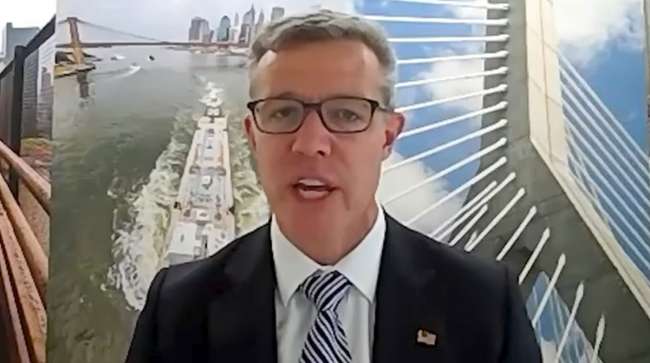Senior Reporter
AASHTO Highlights Funding, Infrastructure Resilience Policies

[Stay on top of transportation news: Get TTNews in your inbox.]
Long-term funding for highway programs, greater focus on severe-weather resilience and enhancing resources for electric vehicle charging infrastructure are policy priorities for the association that represents the country’s state transportation agencies.
In a recent outline of policy directives, the American Association of State Highway and Transportation Officials called on members of Congress to clear for President Joe Biden comprehensive highway policy legislation this year.
This month, the House passed a five-year highway policy bill, titled the INVEST in America Act. While the bill would update a 2015 federal surface transportation law, which expires Sept. 30, it did not establish guidance for long-term, sustainable funding for surface transportation programs. Soon after the House passed its highway policy bill, AASTHO called on policymakers to rush the legislation to President Biden’s desk for enactment.
“AASHTO congratulates the House of Representatives on the passage of the five-year INVEST in America Act, which is a major step toward reauthorization of the federal surface transportation program,” Executive Director Jim Tymon said. “With infrastructure investment being the top national priority, AASHTO continues to call for a bipartisan bill that strengthens and builds upon formula-based funding to states, while maintaining the flexibility necessary to allow states to deliver national transportation priorities including equity, resiliency, carbon reduction, safety for all roadway users, improving project delivery, and, maintaining and improving their transportation assets.
“We also believe a robust five-year surface transportation reauthorization must be the centerpiece of any enacted infrastructure package, and look forward to assisting Congress and the Biden administration to get [it] across the finish line by Sept. 30.”
Meanwhile, the Senate has yet to finalize its version of a comprehensive highway policy bill as the White House continues to negotiate on transportation and infrastructure measures with policymakers on Capitol Hill.
AASHTO Policy Recommendations by Transport Topics on Scribd
Such infrastructure measures likely would update soon-to-expire surface transportation policies, promote research and development programs for new technologies, and ensure a sustainable source of funding for the Highway Trust Fund account. Gas and diesel tax revenue is insufficient to meet the Highway Trust Fund’s long-term obligations. The fund, which assists states with highway maintenance projects, is propelled via the 18.4 cents-per-gallon gas tax and 24.4 cents-per-gallon diesel tax. Those rates were set in 1993.
AASHTO emphasized that infrastructure proposals are “critical first steps in a bipartisan conversation about a generational investment to help address very large surface transportation infrastructure investment backlogs while addressing climate change, resiliency and equity.”
“The goal of these multimodal investments is to address transportation infrastructure needs that support improved national competitiveness and quality of life through innovative, safer and cleaner mobility options for decades to come,” AASHTO said in its “Policy Recommendations on key Surface Transportation Priorities,” published this month.

How do you care for your tires? Host Michael Freeze sets out to answer what factors fleets should consider when investing in TPMS and ATIS. He's joined by Matt Wilson of Hendrickson. Hear a snippet above, and get the full program by going to RoadSigns.TTNews.com.
Priorities for AASHTO pertain to transportation equity, safety, transit, passenger rail, severe-weather infrastructure resilience, greenhouse gas emissions, rural broadband and electric vehicles, among other issues.
Per severe-weather resilience proposals, AASHTO noted, “Congress should avoid new plans, programs, and analysis processes that increase cost and burden to state DOTs, and a segmented definition of resilience that focuses solely on climate change, extreme weather events or assets rather than an all-hazards approach which includes eligibility for projects or programs that achieve varying types of resilience benefits, including agency and asset performance.”
Regarding equity concerns, the group indicated: “State DOT leaders pledge to approach these efforts with humility, introspection and respect, being mindful of the importance of listening to and learning from those most adversely affected by past decisions. AASHTO’s members understand that these measures depend on collaboration with all relevant stakeholders, including government, transportation partners and the communities they serve.”
Want more news? Listen to today's daily briefing below or go here for more info:

